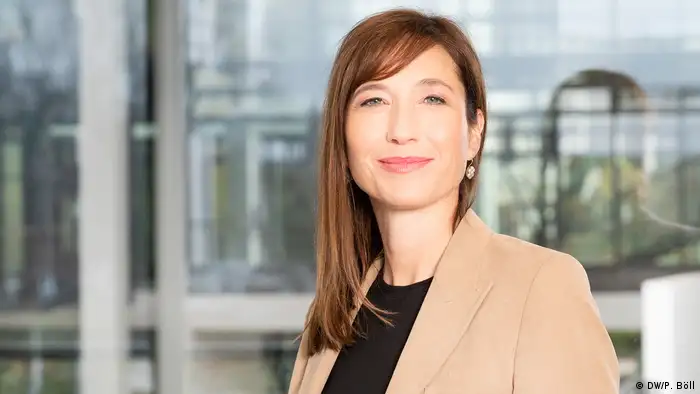Press
The working environment of the future: Is New Work the new normal?
In the latest Weltzeit issue, Barbara Massing, DW Managing Director of Business Administration, talks about changes in work culture and new forms of collaboration.
To what extent has New Work changed the work culture?
I think it is accurate to talk about a paradigm shift in this context. Parallel to digital transformation, which is affecting all areas of life, a new corporate and work culture is developing in which personal responsibility, a sense of purpose and networking are more important than hierarchies. New Work is characterized by flexibility and agility; hierarchies are also fading into the background. It is important to involve professional expertise directly and early on in every process. The new way of working is more focused on participation, collaboration, and greater opportunities for development. Employees work together on projects across locations and countries, sharing and expanding their knowledge and exchanging ideas. In this context, the aspect of creating purpose is very important; employees want to contribute to the big picture. If this is seen either as a requirement for a job or as a criterion for selecting an employer, DW has a convincing advantage with its meaningful mission and its brand core “Unbiased information for free minds”
That sounds like a “bold new world”. What does the change in work culture mean specifically for DW?
With the onset of the pandemic, we saw that the groundwork DW had already begun on New Work in 2019 paid off. Conceptually, it defined three central fields of action: Digital Leadership and Collaboration, Digital Workplace and New Meeting Spaces. The basis for New Work is the attitude and the way managers and employees work together—in the sense of Digital Leadership and Collaboration. Managers define goals and frameworks, employees work more independently. Important elements are knowledge management—learning from each other, from best practice examples, but also from mistakes—the promotion of interdisciplinary collaboration, and a constructive and open feedback culture between employees and managers, at colleague level, right through to peer coaching.
The Digital Workplace focuses on professional frameworks and equipment and is constantly improving opportunities for digital, mobile, and collaborative working. Mobile working has replaced the traditional importance of being on-site in offices. Therefore, it is all the more important to make the best possible use of time on site at the broadcasting centers for joint creative work and exchange, supported by optimized meeting places. Our cross-directorate New Work team is constantly developing the concept, addressing the needs of the directorates, and providing employees with concrete support, including tips in our “New Work Snacks” format. All of this is not an end in itself. We are actively facing up to the digital transformation in all its dimensions in order to secure the future of our company with the help of highly motivated, qualified employees who help shape change.
Speaking of qualifications, what is DW doing to attract skilled experts and retain employees?
DW sees itself as a learning organization. We attach great importance to continuous education, both through the People department and through the internal format “DW Minds”, in which employees share experience from their areas of expertise and lessons they learn in dialog with others. When competing for talent, the attractiveness of a company plays an increasingly important role. In addition to the meaningfulness of one’s own work, the focus is shifting to the orientation of the (potential) employer. DW is well-positioned in this respect thanks to its mission. This sometimes helps us in areas where we feel the shortage of skilled workers, such as IT or engineering.
We practice value-based recruiting, promote young talent through multilingual traineeships, in-company training—including part-time—and cooperation with universities. We promote diversity, inclusion, and equal opportunities through active diversity management. For example, DW has already achieved a great deal in terms of gender equality: currently, the proportion of women in management positions is 45percent. DW is characterized by employees with international backgrounds and different perspectives based on their individual experiences, and this diversity is increasingly reflected in the staffing of management positions. Self-initiated networks such as Pride@DW and the LGBTQI+ working group also provide an important impetus, which we discuss together and leverage to derive measures. Another important pillar of DW is its commitment to sustainability. Sustainability Management has an ambitious climate protection target and is firmly anchored in the corporate culture.
And what about work-life balance at DW?
From my point of view, it works quite well at DW. The possibility of achieving a good work-life balance is another important criterion when choosing an employer. DW wants to create a working environment in which employees enjoy working and can develop their potential to achieve common goals. We offer flexible working hours and employment models, easily adaptable part-time options, top sharing, sabbaticals, as well as the opportunity to work temporarily from other countries within the EU. We have many working mothers and fathers in leadership positions who encourage others to embrace leadership, even if they are serious about taking care of their children. And we are pleased that an increasing number of fathers is taking parental leave.
What skills do managers need to promote personal responsibility and self-determination among employees?
Nowadays, managers take on a much stronger role as enablers. In terms of digital leadership and collaboration, they promote personal responsibility, act as role models, and create the framework for interdisciplinary teams. The central leadership element is communication. Clear task clarification and the definition of common rules are required. This applies all the more when teams work remotely and need to be kept together. This requires motivation through feedback, respect and appreciation. In addition to technical and digital competence, managers need a high level of social competence. We try to systematically support our managers in their work as leaders, with targeted management programs for new and experienced managers, cross-directorate networks, collegial advice, individual training, or coaching offers. Learning and Development and the New Work team also support managers in working together with their teams. All the work around New Work has also been recognized outside DW: it was already honored with the New Work Award in 2020. We were on the right track early on, which we are now continuing together.
- Date 02.06.2023
- Author Dagmar Schroeter
- Feedback: Send us your feedback.
- Print Print this page
- Permalink https://p.dw.com/p/4S82i
- Date 02.06.2023
- Author Dagmar Schroeter
- Send us your feedback.
- Print Print this page
- Permalink https://p.dw.com/p/4S82i


